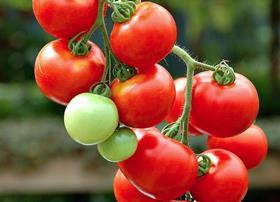
This year’s vintage summer has been good news for tomato sales, as consumers fired up the barbecues in their droves and made sure those garden parties were bursting with salads.
In the past year UK tomato sales have risen by 4.1 per cent, adding over £30 million of sales to the category, while volumes sold rose by 1,000 tonnes [Kantar Worldpanel, 52 w/e 7 October].
That is helping generate a feelgood factor for the category, which got the summer off to a positive start from a marketing perspective with the annual British Tomato Week in May.
While the sales rise can partly be attributed to increasing production costs, particularly on imports in a category where as much as 80 per cent is imported, it also reflects a growing premiumisation of the sector.
Tomatoes continue to be well-supported by promotions, particularly on six-packs, and regularly feature in Super 6 and similar offers. That means they remain a regular purchase, with shoppers defying price inflation to buy more frequently.
Tesco, Sainsbury’s, Aldi, Lidl and Waitrose have all performed well with their premium offers, with Lidl in particular having secured a share of the tomato market almost double that of its overall market share. As shoppers did more convenience and top-up shopping over the summer, that also boosted sales in the likes of the Co-op, according to Alex Margerison-Smith, commercial manager at Keelings. “Summer really drove sales, and the Co-op did really well in that period with its convenient offer,” he says.
While smaller tomatoes are resonating particularly well with shoppers, Margerison-Smith believes Britain still hasn’t fully grasped the snacking opportunity in the same way as, say, the Dutch, where small tomato snack packs are much more commonplace.
“Once the UK gets on board there’s a real market there,” he adds. “But it needs to be put in different parts of the supermarket as at the moment it’s not competing with confectionery and so on.”
The familiar concerns around Brexit are just as prominent in tomatoes as in other crops, but there’s also a feeling that pro-British sentiment could boost the home-grown tomato sector if growers can be convinced they will see a return on their investments. While growers in other countries might focus on a specific speciality tomato, there’s the potential to grow a wide spread of different premium varieties from single facilities on these shores.
Elsewhere on the production side, there is concern over the emergence of a new tomato virus which has appeared in Germany. The Tomato Brown Rugose Fruit Virus is said to cause significant economic damage, and the situation is being monitored by Fera senior virologist Dr Adrian Fox. The British Tomato Growers Association has advised growers to make themselves aware of the symptoms but has stressed that the risk to UK crops is still thought to be low.
Fingers will be crossed that no new viruses find their way to disrupt a sector that is showing encouraging growth with a product that taps into modern consumer desires.



